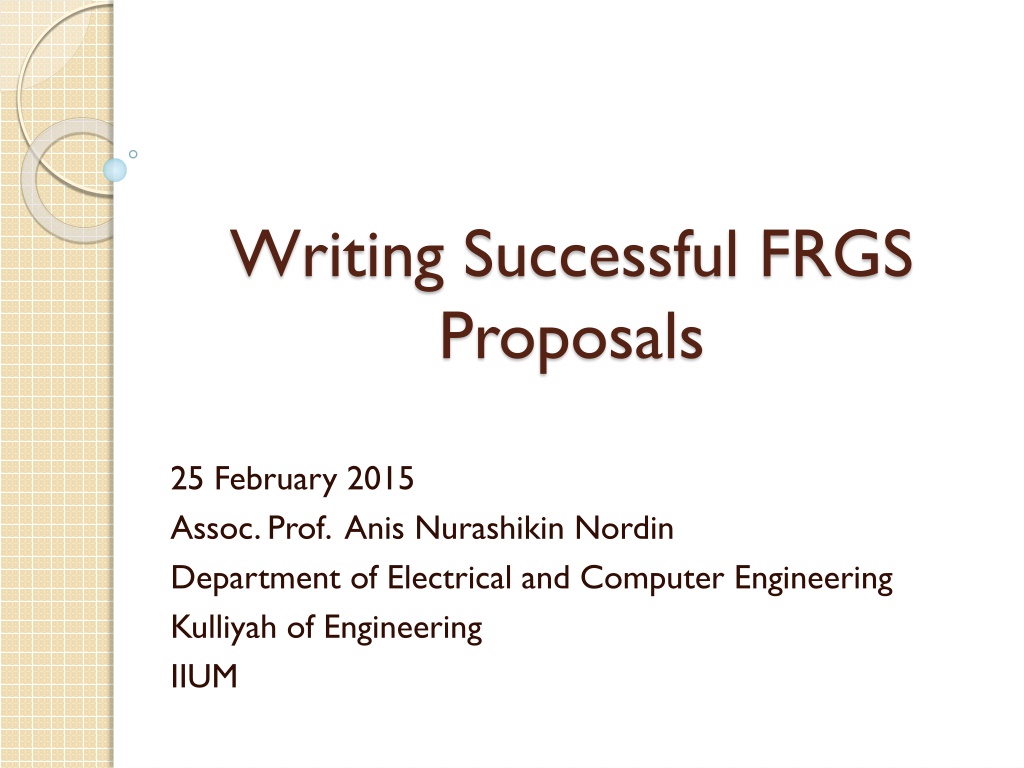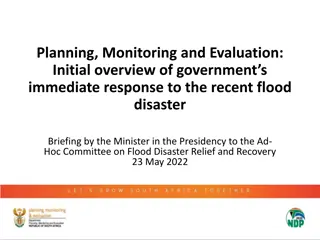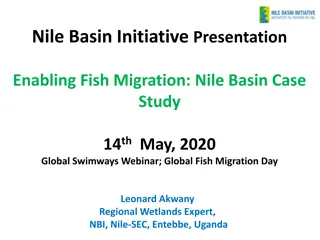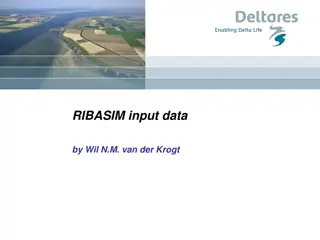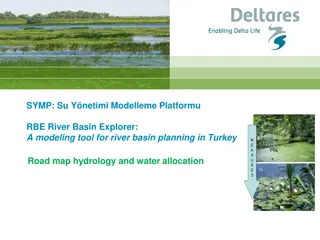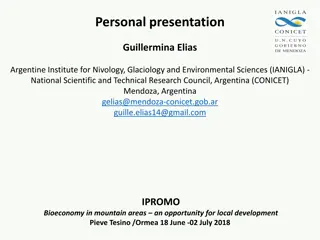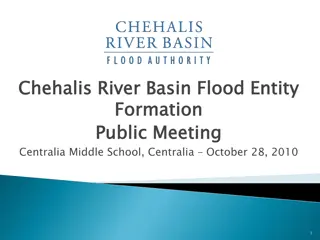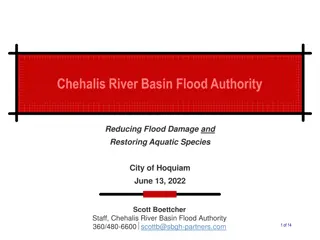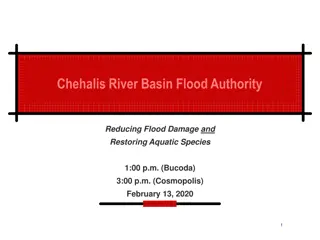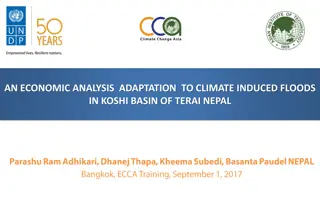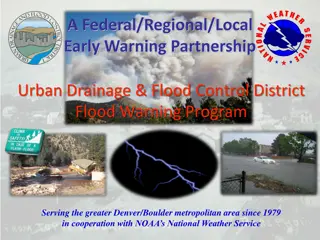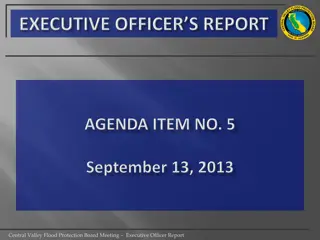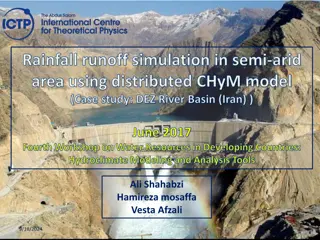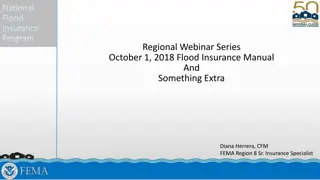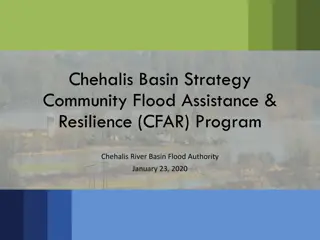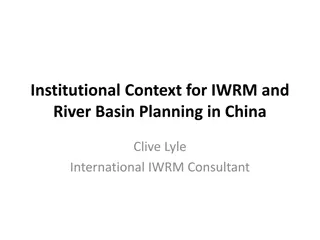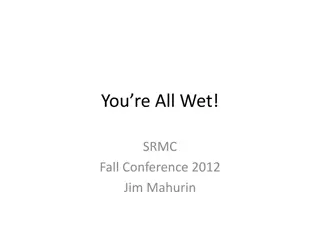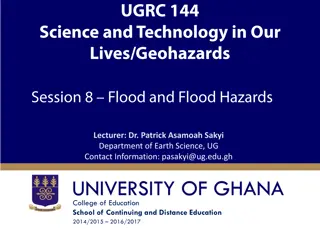Enhancing Flood Disaster Management through Integrated River Basin Approach
Explore the framework for effective Flood Disaster Management through a holistic approach, focusing on river basins' characteristics, environmental impacts, flood triggers, and sustainable solutions. Emphasizing the importance of urbanization management and governance for Disaster Risk Reduction to mitigate flood risks and ensure sustainable development.
- Flood Disaster Management
- River Basin Approach
- Environmental Impact
- Risk Reduction
- Sustainable Development
Download Presentation

Please find below an Image/Link to download the presentation.
The content on the website is provided AS IS for your information and personal use only. It may not be sold, licensed, or shared on other websites without obtaining consent from the author. Download presentation by click this link. If you encounter any issues during the download, it is possible that the publisher has removed the file from their server.
E N D
Presentation Transcript
Writing Successful FRGS Proposals 25 February 2015 Assoc. Prof. Anis Nurashikin Nordin Department of Electrical and Computer Engineering Kulliyah of Engineering IIUM
Presentation Outline FRGS Flood Disaster Management Guidelines Theme FRGS Definitions Common Mistakes Q&A
Reading the Guidelines First step of writing the proposal is to read the guidelines by the sponsor Sponsors (MOE, MOSTI, MOA) change their guidelines each time the call for proposals are released. Writing proposals are like writing an exam, the answers should fit into the answer scheme proposal guidelines
Flood Disaster Management Study Approach River basin framework Unique due to its natural delineation based on water divide Hydrological and geo-morphological processes and interaction between biota and abiota can be established and quantified. Focus on Sg Kelantan and Sg Pahang basins most affected by the recent flood disaster. Information and data to be used to formulate effective Disaster Risk Reduction (DRR) strategy. Studies in other river basins ( e.g Sg Johor, Sg Muar, Sg. Kemaman, Sg Perak, Sg Sarawak, Sg BatangTatau, Sg Silau), are also encouraged Research must aim for sustainable development (economical, environmental, social) DRR towards providing solution to flood disaster (fundamental and applied).
Flood Disaster Management Main Theme Holistic solution to flood disaster based on Integrated River Basin Management
Flood Disaster Management Sub Themes Basin characteristics: geomorphological and hydrological processes, catchment morphometry, vegetation over. Impact on environmental assets: forest, forest management, water supply and water quality, aquatic habitat, environmental flow, bio-diversity etc. Flood and flood disaster: trigging and causal factors, mechanism of disaster, risk and uncertainties, impacts, early warning system, flood protection and mitigation measures, flood modeling and prediction, climate change, weather forecasting, etc. Land-use and land-cover: land-use management and administration, effectiveness of land-cover policy, spatial analysis, sustainable resource utilization, etc.
Flood Disaster Management Sub Themes Urbanization and industrialization: villages, township and city, transportation, evacuation processes, relief program, floodplain settlement/encroachment, etc. Governance for disaster risk reduction: law and legislation, development plan, resources protection, awareness, institutional arrangement, policy and guidelines, SOP, insurance, living with flood, etc. Health and safety: Community based, psychosocial, infectious and non-infectious diseases, chronic diseases, food security, water borne diseases, vector borne diseases, education, vandalism, social problem, etc.
Flood Disaster Management Sub Themes Disaster relief and preparedness: Volunteerism, response and preparedness, recovery, ERP, livestock relief, solid waste management, mobile facilities (water, energy, sanitation, communication, cooking facilities), mobile hospital, consultation and fatwa for coping with disaster, etc. Socio-economic wellbeing: lost income / job / opportunity / agriculture / livestock / infrastructure, flood damage functions, disaster ethic / values, etc. Flood resilience structures: Relief centre, architectural design, material, water supply facilities / water technology, etc.
Definition of Fundamental Research Basic knowledge about the human world. It focuses on refuting or supporting theories that explain how this world operates, what makes things happen, why social relations are a certain way, and why society changes . research advances fundamental Basic research generates new ideas, principles and theories, which may not be immediately utilized; though are the foundations of modern progress and development in different fields
Definition of Fundamental Research Also known as basic research or scientific investigation for its own sake. The goal of fundamental research is to gain/discover new knowledge and understanding of the physical world that may lead to: new theories or extending and refuting existing theories, models or algorithm policy recommendation improving technology at the fundamental level. Without regard to whether or not the knowledge discovered will be of any practical use.
Definition of Fundamental Research This is different from applied research, in which scientific investigation is carried out in order to discover a solution to a practical problem. Survey, baseline and observational studies alone are not fundamental research.
Characteristics of a high quality research proposal Informative title Convincing executive summary Clear problem statement Scientific background and rationale; Good selection of research methods Ethical considerations; Realistic budget and schedule
Proposal Evaluation Title: Novel Reflects fundamental issues Brief Example: Novel method to synthesize polymeric biphasic micro-particles using droplet microfluidic lab on a chip Wrong: Development of autonomous farm tractor systems for agricultural operations
Proposal Evaluation Executive Summary should contain Problem statement, objectives, methodology, expected output, Significance of output Be concise It is the most important part of your proposal First impression of the reviewer will be based on the summary
Proposal Evaluation Objectives should be Specific, Measurable, Achievable, Realistic aand within time-frame (SMART) Reflects the solution/output to the problem Example To model a novel droplet microfluidic platform capable of synthesizing biphasic micro-particles To develop a novel protocol to synthesize micrometer sized particles from monomer droplets
Proposal Evaluation Research background should Elaborate the title Explain the problem statement Include a hypothesis and research questions which help solve the above problems Cite recent references Relating to current government policies
Proposal Evaluation Methodology should Explain the methods to conduct the research (experiments, interviews, statistical analysis) Try to be inline with the research objectives Flowchart, Gantt chart and Milestones should match with each other
Proposal Evaluation Expected Results should include Novel theory Publications in Indexed Journals PG students Impact on society
Choosing your research team Should include researchers with a track record of having successful research project Researchers in the team should be qualified in the area that you wish to research in Team should be balanced to include both experienced and non-experienced researchers Adding too many researchers or those who are not related to the field of research reflects badly on your proposal
Quality of Research Proposal Research proposal should be of high quality No grammatical, spelling mistakes or technical mistakes Meticulous!!
Budgeting Max for FRGS (Flood Disaster Management) RM 100,000 Allocate most for the research assistants Include patent filing costs if a patent is an expected output Travelling and transportation <40% Accessories & Equipment < 40%
Budgeting Vote 11000 (salary and wages) RM2300 for PhD and RM1800 for Master Vote 21000 (travelling expenses and subsistence) Data collection and meeting within the country Conference presentation Lodging, food, flight and taxi fares
Budgeting Vote 24000 (rental): building, equipment, transport, etc. Vote 27000 (research materials and supplies): books, journals, papers, chemicals, animals, etc. Vote 28000 (maintenance and minor repair): sand, cement, building, lab, equipment, etc. Vote 29000 (professional services): printing, honorarium, consultation, training (<3 months), fees Vote 35000 (equipment): special equipment (e.g. camera, tape recorder), upgrading of existing equipment, computer, printer
Conclusion Research should fit into the flood disaster management theme Focus on fundamental research aim to formulate effective Disaster Risk Reduction or solutions to help those affected by the flood Proposals should be prepared meticulously Good research team and Realistic budget May Allah ease your tasks and ALL THE BEST!!
